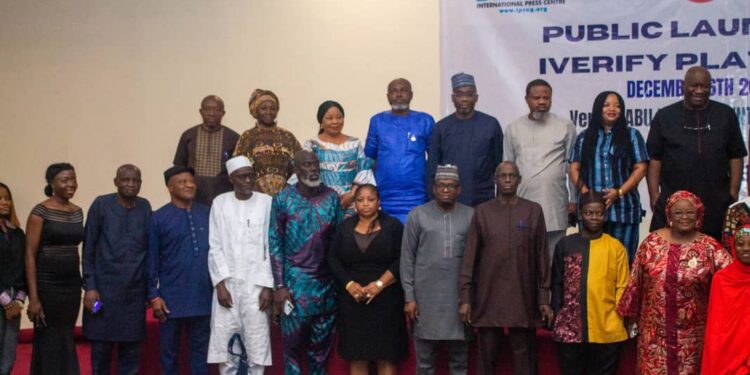The Independent National Electoral Commission has said that that hate speeches and fake news are threats to electoral process and democratic values of the country.
The INEC Chairman, Prof. Mahmood Yakubu, said tjis on Wednesday in Abuja at the launch of the iVerify project and the unveiling of the iVerify fact-checking platform organised by the International Press Centre (IPC), in collaboration with the United Nations Development Programme (UNDP) and the Spanish Government.
Prof Yakubu represented by the INEC Acting Director, Voter Education and Publicity, Mary Nkem, said that hate speech can undermine democratic values, core principles of democracy, such as respect for human rights, and create tension in the society.
“Hate speech undermines democratic values. It undermines the core principles of democracy such as respect for human rights, equality and fair treatment to all individuals.
“Hate speech can perpetrate discrimination and exclusion, contradicting the fundamental value of democratic society.
“It can provoke hostility and aggression, leading to act of harassment and intimidation and even physical violence in the context of the electoral process. This can disrupt the peaceful conduct of elections.
“The proliferation of hate speech in the electoral process can erode public trust in democratic institution, including the electoral system, political leadership and the media,” the INEC boss said.
A representative of the UNDP and the lead team, Mathew Alao, said, “The iverify platform was conceived by UNDP to promote information integrity around election, governance and democratic processes in Nigeria which is coordinated and managed by the IPC.
“The importance of this project is to deepen democratic caution in Nigeria by converting the negative influence on the proliferation of information disorder in the nation’s polity especially during electioneering campaigns.”
Speaking earlier, Executive Director, IPC, Mr Lanre Arogundade said the project was to strengthen efforts against fake news, disinformation, misinformation, and hate speech, particularly in the context of electoral and democratic processes.
“The core objective is to establish a technology-driven platform, provide capacity building for journalists in fact-checking electoral information, promote media literacy, and engage in public enlightenment to combat information disorder. Collaboration is key to advocating for a credible environment in information dissemination.
“The efforts at curbing disinformation will not bring about the desired results if the concept of media literacy is not fully embraced as a way of educating journalists, other media professionals and the public, hence it is an important part of the iverify project,” Arogundade said.
According to him, the IPC has already begun optimising the platform, and that the platform use a tech-savvy fact-checking tool with a human element.
He also said that fact-checkers are overseen by senior journalists to ensure adherence to professional standards.
“There are plans to recruit full-time fact checkers, and freelance journalists, and training of 1,000 fact checkers across 36 states before the 2027 elections,” the IPC boss said.
He urged political parties and handlers of government platforms to take responsibility and that those found guilty of infractions should be held accountable.
He said, “Those found guilty of misinformation, disinformation and malformation should be held accountable for their actions.”











